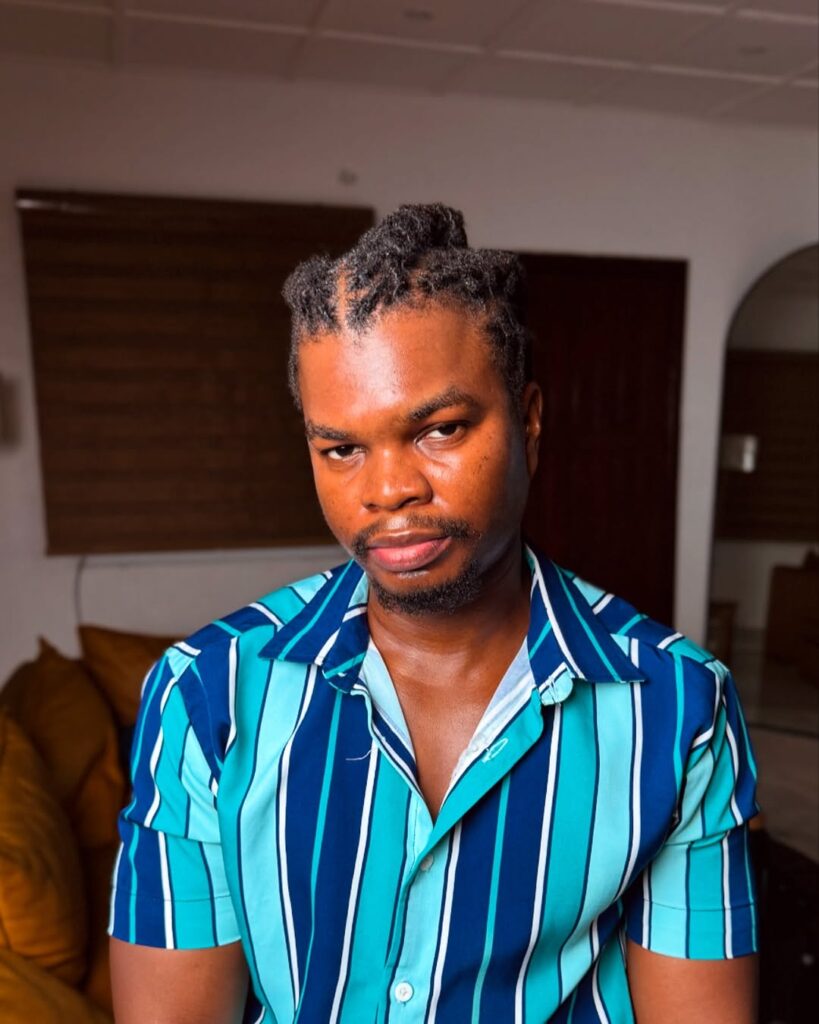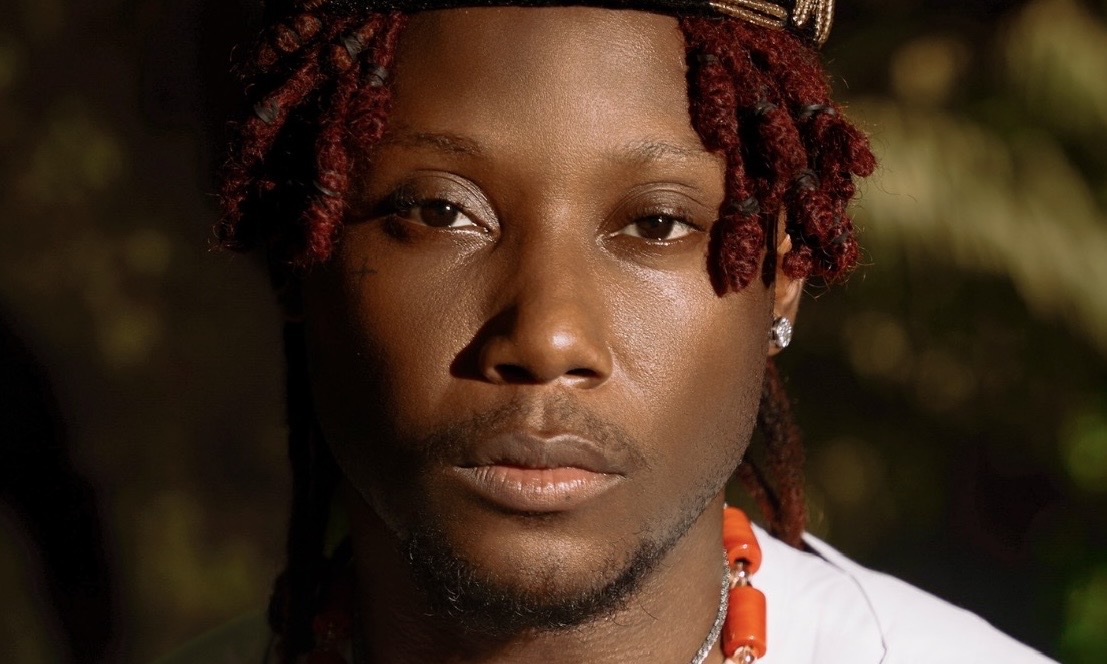
If you’ve ever scrolled past one of Ama’s cooking videos or caught a glimpse of his monthly dinner parties on Instagram, you’ve likely paused. Not just because the food looks delicious—though it does—but because there’s something else on the table: a sense of comfort, intimacy, and joy that feels increasingly rare in today’s world.
Ama isn’t just feeding people. He is creating a safe space for his community. Born an only child and raised partly in a tight-knit village, Ama grew up surrounded by the sounds of clanging pots and family gossip traded over firewood stoves. After losing his mother at a young age and spending much of his youth seeking connection, the kitchen became both refuge and ritual. Today, in the chaos of Lagos, he uses that same language of food and gathering to recreate what he once knew: people coming together, just because.
What started with a few friends in his living room has grown into dinners where strangers become companions, and the menu is just the beginning.
We sat down with Ama to talk about food, friendship, and the quiet revolution of letting people in.
You share your recipes online, but you also open your home to cook for friends. What inspired you to turn your kitchen into a communal space?
I think it really started with where I come from. I grew up in a village where people just showed up; you didn’t need to be invited. They’d say, “We’re coming to eat,” and someone in the house would make it happen. My grandfather was a well-respected man, so people were always around. My aunties would cook, and we’d sit outside, eating and gisting. It was lively, warm, and communal. That stayed with me.
I’m an only child. I lost my mom young, and my dad was a travelling journalist, so I ended up staying with different families. Some didn’t treat me well. Eventually, I moved back to the village and lived with my aunties. We were like cat and dog—always fighting—but we were in the kitchen together all the time. That became a kind of anchor for me.
So, fast forward to adulthood; I moved around a lot and lived in places that weren’t great. I realised I’d spent so much of my life alone. And I remembered how much joy I used to feel when people came around. So one day, in 2021, I invited a few people over to my place in Ibadan, just people I’d met at the gym or on Twitter. I cooked. We laughed. People had fun. And something clicked. I thought, “Wait, this could be something.”
There’s something intimate about inviting people into your home for a meal. What does that kind of gathering mean to you personally?
It’s deeply personal for me. It feels like I’m sharing a part of my story, my roots. Even the act of saying “Come and eat” is layered; it’s how my people show care. It’s not about impressing anyone; it’s about making people feel seen and held.
When I started doing it consistently, I realised that for a lot of us—especially those living in big cities like Lagos—there’s a kind of loneliness that creeps in. Remote work, traffic, burnout… It’s easy to become isolated. Our parents may have had their issues, but they put in effort to maintain a community. They fought, but they still showed up for each other. I think we’ve lost some of that.
So these dinners became my way of holding space. You come over, you eat well, you talk, you laugh, and sometimes you cry. It’s soft; it’s safe. And over time, it’s become something people genuinely look forward to.
Do you think food can create the kind of community people are craving today? What’s something you’ve seen or felt at your table that proves that?
Yes, absolutely. There’s a kind of magic that happens when people gather to eat. And I’ve seen it firsthand. People come in guarded, unsure, maybe even shy. But by the end of the night, they’re laughing, playing games, and opening up about their lives.
One time we had an all-male dinner. Just the guys. And you’d think it would be all surface-level banter, but at some point it turned into a full-on therapy session. People got vulnerable. We talked about life, relationships, and work stress. You don’t expect that kind of vulnerability in those settings, but food does that; it disarms people.
For me, the food is just a gateway. It’s the thing that brings people to the table. But what happens around the table? That’s the real heart of it.
How do you decide who to invite, what to cook, and what the vibe of the evening should be? Is it curated or organic?
It’s a little bit of both. I usually have some kind of theme—it could be the menu, a dress code, or even the type of music we’ll play. But the vibe? That’s always organic.
Sometimes I start with a WhatsApp group. I’ll invite people I’ve worked with or met online, and others I just vibe with. At first, it was 10 people. Then it grew. We’ve had dinners where 40 people showed up. Now people even bring friends of friends.
As for what I cook, it changes every time. I almost never make the same dish twice the same way. I experiment a lot. I try out new flavours, tweak traditional meals, or remix familiar dishes in ways that surprise people. And it works. People now expect something new every time.
Has opening up your kitchen changed the way you cook or even the way you think about food?
It hasn’t changed it; it’s amplified it. I’ve always seen food as more than just sustenance. It’s political, it’s romantic, it’s an artistic expression. Cooking for others has reinforced that. I experiment a lot. Even for my videos, 70% of the time I’m trying something for the first time. I want the food to taste familiar but feel special.
I already knew that food was powerful, but now I see just how layered it is. Food is memory. It’s emotion. It’s a way of saying, “I care.”
I also realised that for someone who hosts a lot, I’m actually not obsessed with eating. I cook because I want it done a certain way; I want it to feel right. The roots of it go back to my village days: pounding yam, frying garri, raising chickens, and harvesting coconuts. I grew up around food that took effort. So when I cook now, even if it’s noodles, there’s an intention behind it.
What’s a meal or night that stands out in your memory, something that reminded you why you do this?
There have been a few. One was my friend’s housewarming, where I cooked for 26 people. I made this yam, plantain, and garden egg sauce dish, and people were just like, “What is this sorcery?” Another time, I made braised beef stuffed into freshly baked bread rolls like a meat pie, but different. Or a chicken parmesan salad with homemade dressing, no Bama involved.
But honestly, what stays with me are the nights when people don’t want to leave. They’re singing at midnight, still eating, still laughing. Or when they threw me a surprise dinner and said, “You’re always feeding us; tonight we’re feeding you.” That’s when I know this is more than just a hobby. It’s love in motion.
What has cooking for friends taught you about love and friendship?
That you don’t have to be besties with everyone, but life is better when you have shared experiences. When someone says, “Come eat,” there’s a kind of love in that. You’re not just feeding their belly, you’re saying, “You matter enough for me to make this for you.”
It has also taught me that love doesn’t have to be loud. Sometimes it’s just in the seasoning or the fact that you remembered someone doesn’t like spicy food.
In a city like Lagos, where things move fast and connections can feel hard, what role do you think home-cooked meals and intimate gatherings can play?
They slow everything down. They remind you that you’re human. In Lagos, it’s easy to get caught up in the hustle. Everyone’s chasing something. But food—especially when shared—grounds you. You’re not just filling your belly. You’re connecting. You’re pausing.
I always say: when you satisfy someone’s hunger, you soften them. That’s why so many date ideas involve food. There’s something about being fed that makes people more receptive, more relaxed. And in a city like this, where connection is scarce, that softness can go a long way.





